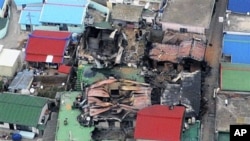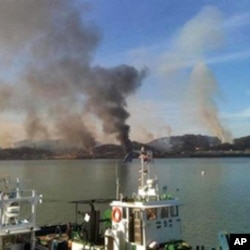Countries around the world are voicing condemnation of North Korea's shelling of a South Korean island, and there is widespread concern about the latest news of Pyongyang's nuclear program. Analysts and officials say China, the North's main ally, needs to do more to pressure Pyongyang to change its behavior.
The world increasingly is looking to China whenever tensions rise on the Korean peninsula. China is the North's biggest trading partner and provides Pyongyang with both political support and economic aid, despite international sanctions.
"The only country that conceivably has influence is China. And that influence comes from the fact that it provides the vast bulk of North Korea's energy and food," said Doug Bandow, a senior fellow at the Cato Institute. "So, the presumption is that if China is really willing to crack down and limit or stop those supplies, it should have clout in the North."
Brandow went on to say, "So far, China has refused to use that potential clout. But that's really the issue. No one else has China's opportunity to pressure the North."
China's response to Tuesday's bombardment - which killed two South Korean marines and two civilans - has been muted, with Chinese officials urging both North and South Korea to work to preserve peace.
Bruce Klingner, a Northeast Asia specialist at the Heritage Foundation, says Washington needs to make clear to Beijing that China's current policy has only exacerbated the problems on its border.
"Beijing has sought to downplay North Korean provocations and violations, hoping that increased U.S. flexibility will resolve the situation. And instead all it did was encourage North Korea to do more," said Klingner.
Earlier this year, an international investigation found North Korea responsible for attacking and sinking a South Korean ship killing 46 sailors. China refused to condemn Pyongyang for the attack.
Klinger says China's continued expansion of economic engagement with the North undermines United Nations sanctions against North Korea and the six-party talks. China is the chairman of the six-party talks - negotiations that seek to end North Korea's nuclear weapons programs.
U.S. officials say participants in the talks - China, South Korea, Japan, Russia - need to take a "unified" approach in responding to the latest developments on the peninsula.
Even before the shelling incident on Tuesday, Sung Kim, Washington's ambassador to the six-party talks, was talking about the need for China to be - as he put it - a "pro-active chairman" of those negotiations.
"Instead of just mediating, we want them [China] to be talking to the North Koreans, using their considerable influence to moderate North Korean behavior," said the ambassador.
But, given that China has refused to use its influence in the past, it is unclear what Washington could do to get Beijing to change its approach.
Chinese President Hu Jintao is visiting the U.S. early next year, an opportunity that some analysts suggest could be used to get concessions from China.
"One would hope that we would use the approaching visit as a way of exerting some pressure on China, using it as leverage, to get China to act as a responsible stakeholder," said Bruce Klingner of the Heritage Foundation. But he said doubts that will happen.
"The U.S. seems to be imposing constraints on its own behavior, out of concern of how China will respond," he said.
Klinger notes the U.S. delay of plans to hold exercises in the Yellow Sea in the wake of the sinking of the Cheonan earlier this year. The Yellow Sea sits between the Korean peninsula and China's northeastern coast. Analysts widely believe those exercises, which were to include the U.S.S. George Washington aircraft carrier, were delayed repeatedly because of strong objections from China.
On Wednesday, however, U.S. military officials in Seoul announced plans to hold a four-day drill in response to the shelling incident. The drill, which begins Sunday, will include the George Washington and be held in the Yellow Sea.
Abe Denmark, an Asia expert at the Center for a New American Security, says that while Beijing's contributions to North Korea's economy are big, its relations with the North are hurting its interests elsewhere.
"We saw that with the sinking of the Cheonan that Chinese reaction to that incident severely damaged China's relationship with South Korea," said Denmark. "So, a lot of people are looking to see if China has re-evaluated its response to these acts and takes a different tack this time than they did with the Cheonan."
Denmark adds that while China's initial comments on the shelling incident have been muted, he expects a shift in Beijing's response in the days to come.





